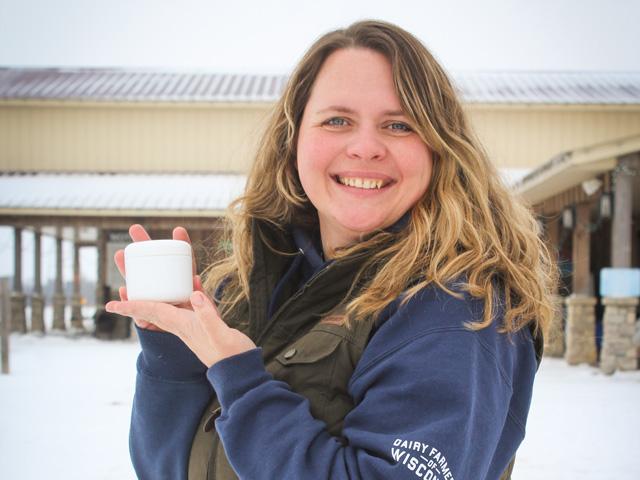From John to John Deere
Lessons from this Century Farm offer a glimpse into a rapidly changing future.
Mike Jackson walks into a building housing a 16-row Kinze planter. He wants to tell a story, he says, about the "doubling effect" of agriculture. Instead, as he lays his hand on the nearest closing wheel, he unwinds a tale about Jacksons who have farmed outside Oskaloosa, Iowa, for a century.
"My great-great-grandfather, Ralph Beach, farmed in Mahaska County in 1922. He used a two-row corn planter," Mike says, pointing to the first two Kinze row units. He backs up to the next set. "My grandpa Mack farmed with a four-row planter," Mike says. He backs up four more row units. "In 1976, my father planted with eight rows," he continues. Pause. "Fast-forward to 2002 when I started farming with a 16-row planter," says Mike, backing to the far end of the machine. He looks up, 16 rows away: "The doubling effect in agriculture."
Mike's easy smile and relaxed gait show he lives his story. "It is stressful carrying this livelihood onto the next generation. For me, the most difficult is taking care of the soil," he says. So many planters have crossed Jackson soils. But, the generations have not ignored it.
Jackson Farms LS is 2,000 acres. Attached to that business is Jackson Seed Sales, purveyor of Latham Hi-Tech Seeds and Iowa Cover Crop. From these southern Iowa hills, Mike targets 200-bushel corn -- 40 bushels more than the county average -- and 60-bushel soybeans.
P[L1] D[0x0] M[300x250] OOP[F] ADUNIT[] T[]
Mike's ticket back to the farm after he graduated from Muscatine Community College was a pair of segregated, early wean hog buildings. Filled with 10-day-old pigs, the buildings produced enough income to bring Mike and family into the operation with Mike's father, Mark, and his mother, JoAnn. Mike farms too, with his uncle and aunt, Tom and Cindy.
GENERATIONAL PULL
Being the only grandson, son and nephew coming back to the farm pulled Mike in three directions. But, there was the payoff. "I felt like I had three fathers," he says. "They all treated me like a son; some days like the hired hand." Who had the most influence? "I looked at whose ground I was working on a particular day ... that's who I listened to," he continues.
But, his farming ethic grew from each of them. "My passion and drive to consistently experiment and continuously improve my farm -- that's what I got from them." And, one lesson in particular from his father, who says, "We've never made any mistakes, but there are many things we won't do again."
Mike, 36, is married to Mary Beth. They are raising the seventh generation of Jacksons -- Arianna, 10, Johnathon, 8, and Mack, 5 -- in the family's 100-year-old white, frame house a few yards off Iowa Highway 92.
Arianna learned some new farming lessons herself this year. She raised her first 4-H calf -- a project with a lesson, Mike believes. "About halfway through, they figure out what work is, to not quit." She might learn a bigger lesson, Mike hopes. "The 4-H project gets you to look past the day-to-day and more to the long-term," he says. "Modern farming is a marathon. The hard work of feeding, getting the calf to trust you and then teaching it to obey you is an experience to build on."
Mike knows every inch of this rolling corn and soybean farm. He scouts the ground by wooden-handled spade and a drone buzzing overhead. He finds worms and traces of old roots in soils transformed -- able to absorb even torrential rains like a sponge. Mike's dad, Mark, has been no-tilling the farm since the late 1980s. Father and son added cereal rye. "We began flying on cover crops five years ago," Mike says. They soon made a sound investment in a 40-foot John Deere air seeder.
SOILS TAKE TIME
"Building soil health takes time, year over year," says Mike, as he digs down into a soybean field, his black lab, Margo, bounding through the soybeans around him. "The soil falls apart and crumbles in your hand," he shows. "Cover crops are a natural addition to no-till."
Mike invests, too, in a generation beyond the farm. Mike and Karen Adams, director for "Ag in the Classroom" in Iowa, brings to his farm by Skype fifth-grade classes at Oskaloosa Elementary School. Farmer Mike, as they call him, Skypes during planting and harvest. Students Skype as Mike scouts fields. He delivers a corn plant sprouted from seed they "planted." "It's educational for them to see how we farm, why we farm from our point of view," Mike says. "This is such a noble life."
While Mike offers students a view forward, he tells of a time past. "My dad tells me how my great-great-grandfather would drop the reigns on his old workhorse, John, and he would still walk straight. Today, I push a button in my tractor, and the tractor plants straight. But, we plant in the same soils -- me a few more rows at a time than he did. My great-great-grandfather planted with John, and I plant with John Deere. I think we both made the world a better place."
[PF_1219]
Copyright 2019 DTN/The Progressive Farmer. All rights reserved.



